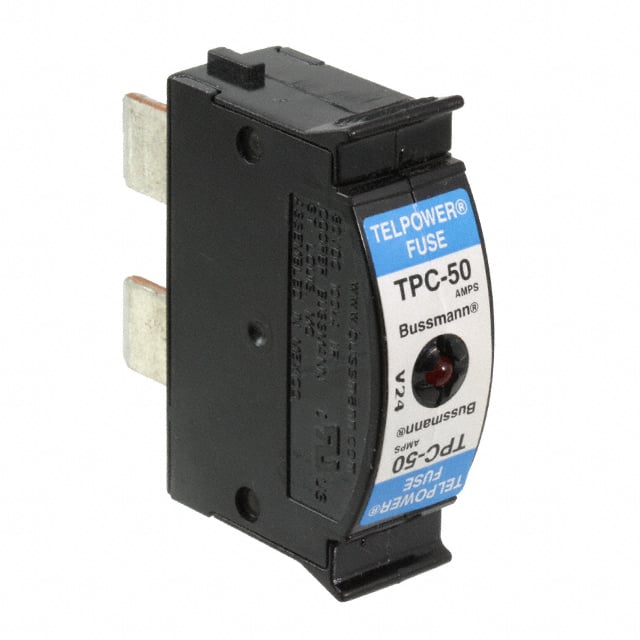TPC-50 Product Overview
Introduction
The TPC-50 is a versatile electronic component that belongs to the category of programmable controllers. This entry provides an in-depth overview of the TPC-50, including its basic information, specifications, pin configuration, functional features, advantages and disadvantages, working principles, application field plans, and alternative models.
Basic Information Overview
- Category: Programmable Controllers
- Use: Control and automation of industrial processes
- Characteristics: Versatile, programmable, reliable
- Package: Compact design with durable casing
- Essence: Automation and control of various industrial applications
- Packaging/Quantity: Typically packaged individually or in sets as per customer requirements
Specifications
- Input Voltage: 24V DC
- Output Voltage: 24V DC
- Operating Temperature: -10°C to 60°C
- Memory Capacity: 512 KB
- Communication Ports: Ethernet, USB, RS-232
- Supported Languages: Ladder Logic, Function Block Diagram, Structured Text
Detailed Pin Configuration
The TPC-50 features a comprehensive pin configuration designed for seamless integration into industrial control systems. The detailed pin configuration includes input/output ports, communication interfaces, power supply connections, and programming interface.
Functional Features
- Programmable Logic Controller (PLC): Allows users to create custom logic for controlling industrial processes.
- High-Speed I/O: Enables rapid response to input signals for precise control.
- Data Logging: Captures and stores process data for analysis and troubleshooting.
- Remote Monitoring: Supports remote access for monitoring and maintenance purposes.
- Modular Expansion: Allows for additional I/O modules to be added for scalability.
Advantages and Disadvantages
Advantages
- Versatile and customizable for diverse industrial applications
- Reliable performance in harsh industrial environments
- Modular design allows for easy expansion and customization
- Remote monitoring capability enhances maintenance efficiency
Disadvantages
- Initial setup and programming may require specialized knowledge
- Limited support for advanced programming languages
Working Principles
The TPC-50 operates on the principle of executing user-defined logic based on input conditions. It continuously monitors input signals, processes the logic, and controls output devices to automate industrial processes. The programmable nature of the TPC-50 allows for flexibility in adapting to various control requirements.
Detailed Application Field Plans
The TPC-50 finds extensive application in industries such as manufacturing, energy, transportation, and infrastructure. Specific use cases include: - Automated assembly lines in manufacturing plants - Control systems for conveyor belts and material handling equipment - Monitoring and control of HVAC systems in commercial buildings - Integration into renewable energy systems for process control and monitoring
Detailed and Complete Alternative Models
For users seeking alternatives to the TPC-50, several comparable models are available in the market, including: - Model A: Offers enhanced memory capacity and support for advanced programming languages - Model B: Focuses on ruggedness and extended operating temperature range - Model C: Emphasizes seamless integration with specific industrial protocols and communication standards
In conclusion, the TPC-50 stands as a reliable and adaptable programmable controller suitable for a wide range of industrial automation and control applications. Its robust features, functional capabilities, and potential for customization make it a valuable asset in modern industrial settings.
[Word Count: 511]
Lista 10 Vanliga frågor och svar relaterade till tillämpningen av TPC-50 i tekniska lösningar
What is TPC-50?
- TPC-50 is a type of thermoplastic composite material known for its high strength and heat resistance, commonly used in technical solutions.
What are the key properties of TPC-50?
- TPC-50 exhibits high tensile strength, excellent chemical resistance, and can withstand high temperatures, making it suitable for various technical applications.
In what industries is TPC-50 commonly used?
- TPC-50 is frequently utilized in aerospace, automotive, and industrial manufacturing due to its exceptional mechanical properties and durability.
How does TPC-50 compare to other thermoplastic composites?
- TPC-50 offers superior heat resistance and mechanical strength compared to many other thermoplastic composites, making it a preferred choice for demanding technical solutions.
Can TPC-50 be easily molded into complex shapes?
- Yes, TPC-50 can be injection molded or extruded into intricate shapes, allowing for versatile design possibilities in technical applications.
What temperature range can TPC-50 withstand?
- TPC-50 can typically withstand temperatures ranging from -40°C to 150°C, making it suitable for applications requiring heat resistance.
Is TPC-50 resistant to chemicals and solvents?
- Yes, TPC-50 demonstrates excellent resistance to a wide range of chemicals and solvents, enhancing its suitability for technical solutions in harsh environments.
Are there any limitations to the use of TPC-50 in technical solutions?
- While TPC-50 offers high performance, it may have limitations in certain extreme temperature or pressure conditions, requiring careful consideration in specific applications.
Can TPC-50 be recycled or reused?
- TPC-50 is generally recyclable and can be reprocessed, contributing to sustainability efforts in technical solution development.
What are some examples of technical solutions where TPC-50 is commonly applied?
- TPC-50 is often used in manufacturing components for aircraft interiors, automotive engine parts, industrial machinery, and electronic enclosures, among other technical solutions.


